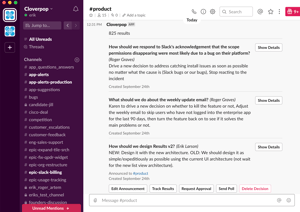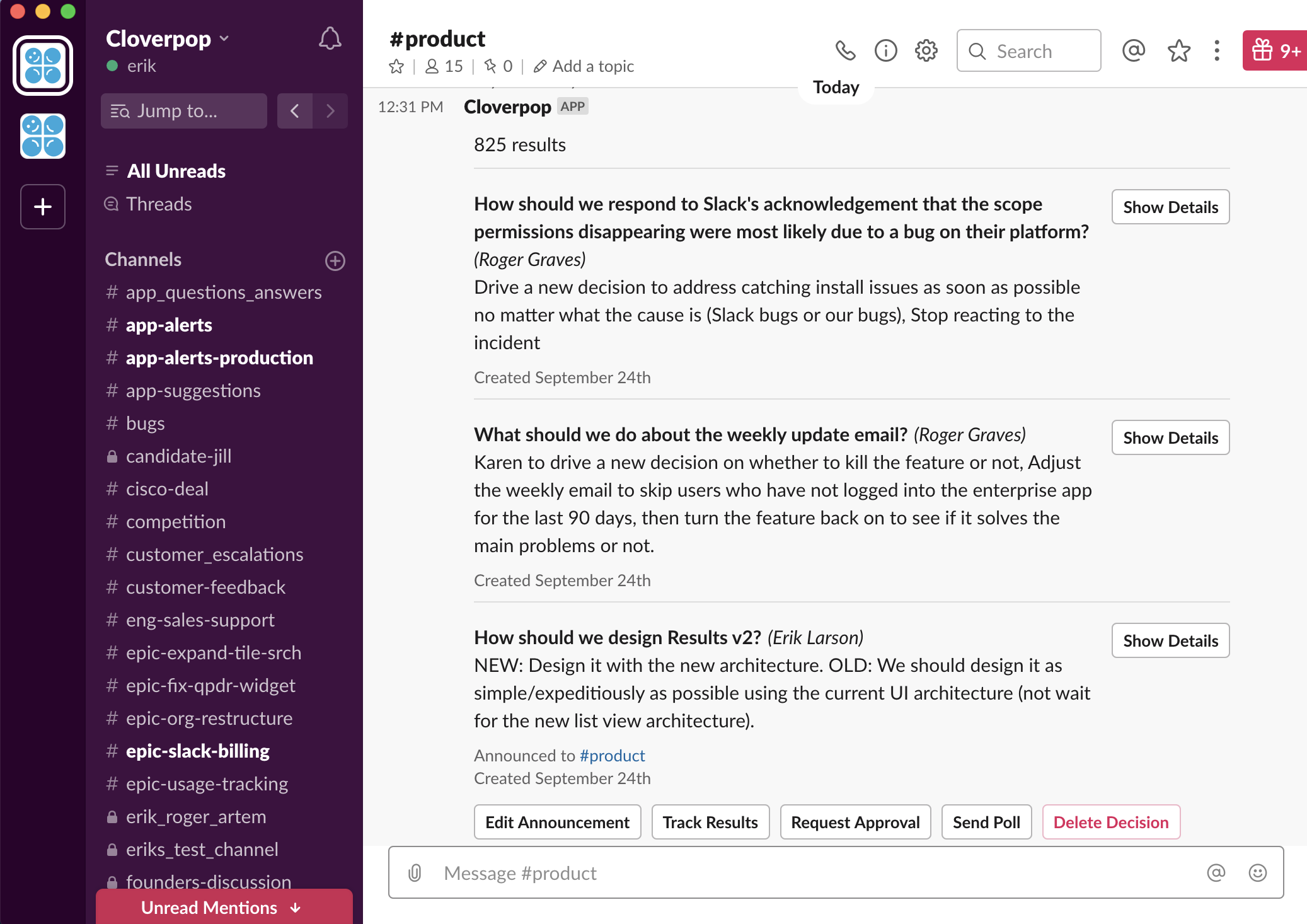
At Cloverpop, we share and track every significant business decision we make in Slack. I mean that literally — we write down all our important decisions and track them in Slack using our own Cloverpop app.
At first this way of working felt a bit weird. Now that we've done it for a while, it seems much weirder that other companies DON'T work this way. It has spoiled us forever.
Our decisions are not buried in docs or emails or chat, tossed in the dustbin of meeting notes or lost in the fog of vague memories. In fact, we usually don’t discuss decisions in meetings unless someone has first framed them up and asked for others' input in writing. And if someone brings up a past decision and there's no explicit record of it, the decision-maker knows without a word that they are accountable for any failure or friction.
Perhaps strangest of all, while this way of working lacks the frenzy and drama of many other fast-paced workplaces like ours, is not dry or boring. Our relationships are more open and productive and our work is more creative and satisfying. Keeping track of our decisions makes our company efficient, friendly and smart.
How Tracking Decisions Makes Our Lives Better
How we do this matters, but how it makes our lives better matters a lot more. Here are just a few examples:
- We don't have to dig through Slack and Google Docs and email to figure out what happened after a day, weekend or week away. When we get back, we just check the list of decisions that happened while we are gone and in a few minutes we're 95% up to speed.
- There's no need to get sucked out of a vacation in paradise into the muck of messages and documents. This is only relevant for those of us who like or need to check in on work while on vacation, but it’s a big life upgrade if it applies to you. On my recent vacation to Hanalei I’d occasionally snag a few minutes to weigh in on pending decisions and rate my support for new ones, then head out to the beach with a clear mind. Mischief, managed.
- No one is ever blindsided by decisions, even if we missed the meeting or are ten time-zones away or struggle with English or are buried deep in a different project. If we were directly involved, we were asked in writing to weigh in on it. If our work was impacted by the decision, we were immediately informed of it and asked to rate our support for it. And we don't have to read 100% of our high-noise/low-signal emails, chat messages and meeting notes to stay in the loop.
- When people feel frustrated trying to get something done, we solve our own problems fast by writing up a decision and driving it ourselves. If a discussion thread is getting too long and heated, it gets written up as a decision. If people disagree about a design specification, it gets written up as a decision. And anyone can do this, because everyone knows they'll be involved and informed if the decision involves or impacts them.
- Even when people disagree, we're still willing to commit, because every decision is tracked. We record our counter-argument and set a date to review the decision once results are in. If we were wrong, we learn why. If we were right, we know it will get revisited. In the meantime, the decision gets made and people get moving on it.
The Emotional Downside Of Tracking Decisions
To be fair, there are some emotional downsides to writing decisions down.
If someone feels strongly for or against a new idea and starts to build up a strong head of conversational steam (ahem, people like me), we have to learn to give room for the process to work and let the pressure off some other way.
If we are in a meeting and someone says "That sounds like a decision," we generally don't high-five in triumph — it's hard to high-five a new decision when your fingers are too busy typing it up.
And it’s disconcerting to write up a decision we just made in a meeting only to realize we're not 100% sure what was decided and where everyone stood. This happens all the time.
Decisions Are Slippery — Unless You Track Them
Slippery decisions are the root cause of a vast array of business problems.
In our customer research, leaders talk about the symptoms all the time: too many meetings and emails, slow decisions, people out of the loop, misalignments, bad results. They talk about better decisions, broader inclusion and more innovation. They talk about the need for tracking clearer goals, deeper analysis and better execution.
But when they talk about tracking their decisions, their brains slip off of the concept. They slide up to goals, they slide down to tasks, they slide back around to results. They care about and invest in decisions and have great anecdotes, but they can’t list them out or grasp them in a concrete way. Their decisions flow by like water and drain away through the gaps.
Decisions are neither goals nor tasks nor results. They sit in between these highly tracked and measured ideas. They are far more slippery. And they are far more important because they tell you with high certainty what is going to happen next. Decisions turn goals into tasks, tasks into results, and results into new goals. Decisions need to be tracked on their own if you want to improve the goals, tasks and results that they create.
Once you start tracking decisions, they stop slipping away. When you can easily find every decision that affects your work:
- Results get a lot more predictable because you can clearly see what your team is going to do next.
- Decisions get a lot easier to delegate because you it's easy to check in on how they are going and how they turn out.
- Change happens a lot faster, because decisions are treated like concrete work to do, measure and improve together.
- People are a lot happier because their voices are heard and they know they're really in the loop.
It may be hard to imagine your company actually tracking decisions like this...if so, you should be very worried. What is it about us humans that lets the most important thing we do just slip away untracked, especially considering all the trouble this causes and all our experience with the power of measuring what we manage? And what are you going to do about it?
Our experience is clear — our lives are better when our decisions are pulled out of our minds, meetings and messages and written out plainly for everyone they touch. Start tracking decisions at your company, and you’ll all be celebrating the results, too.
This article was originally published on Forbes.

